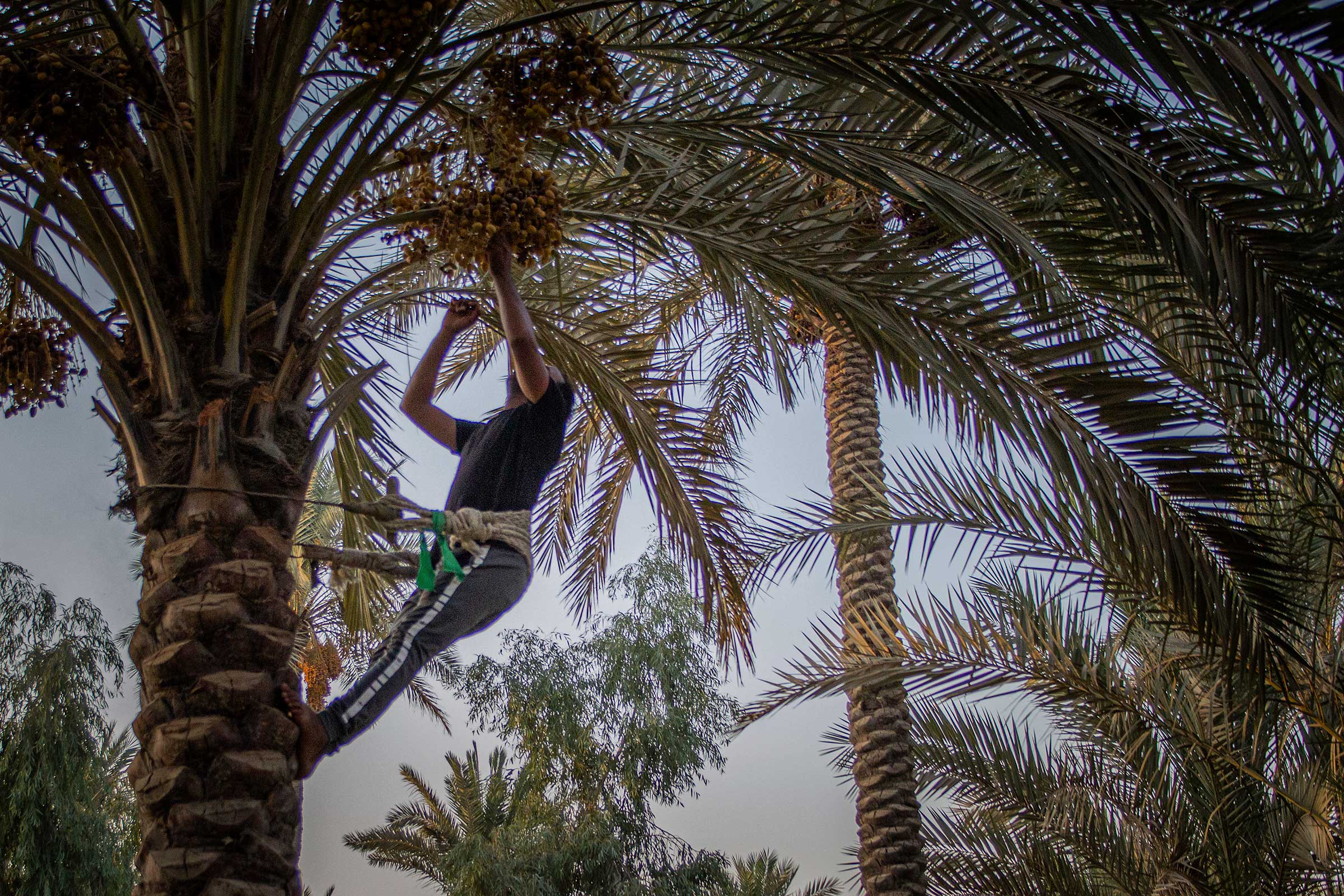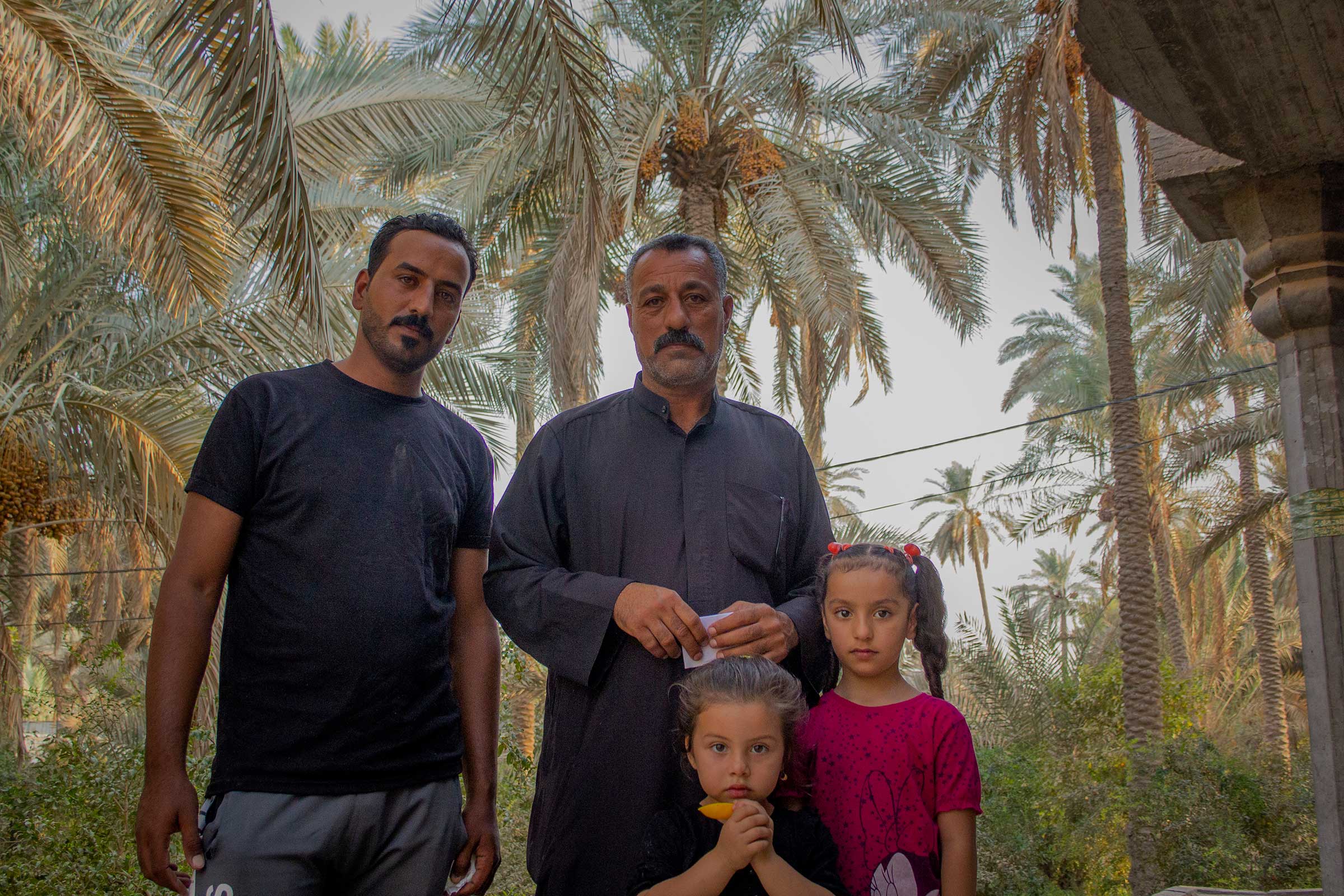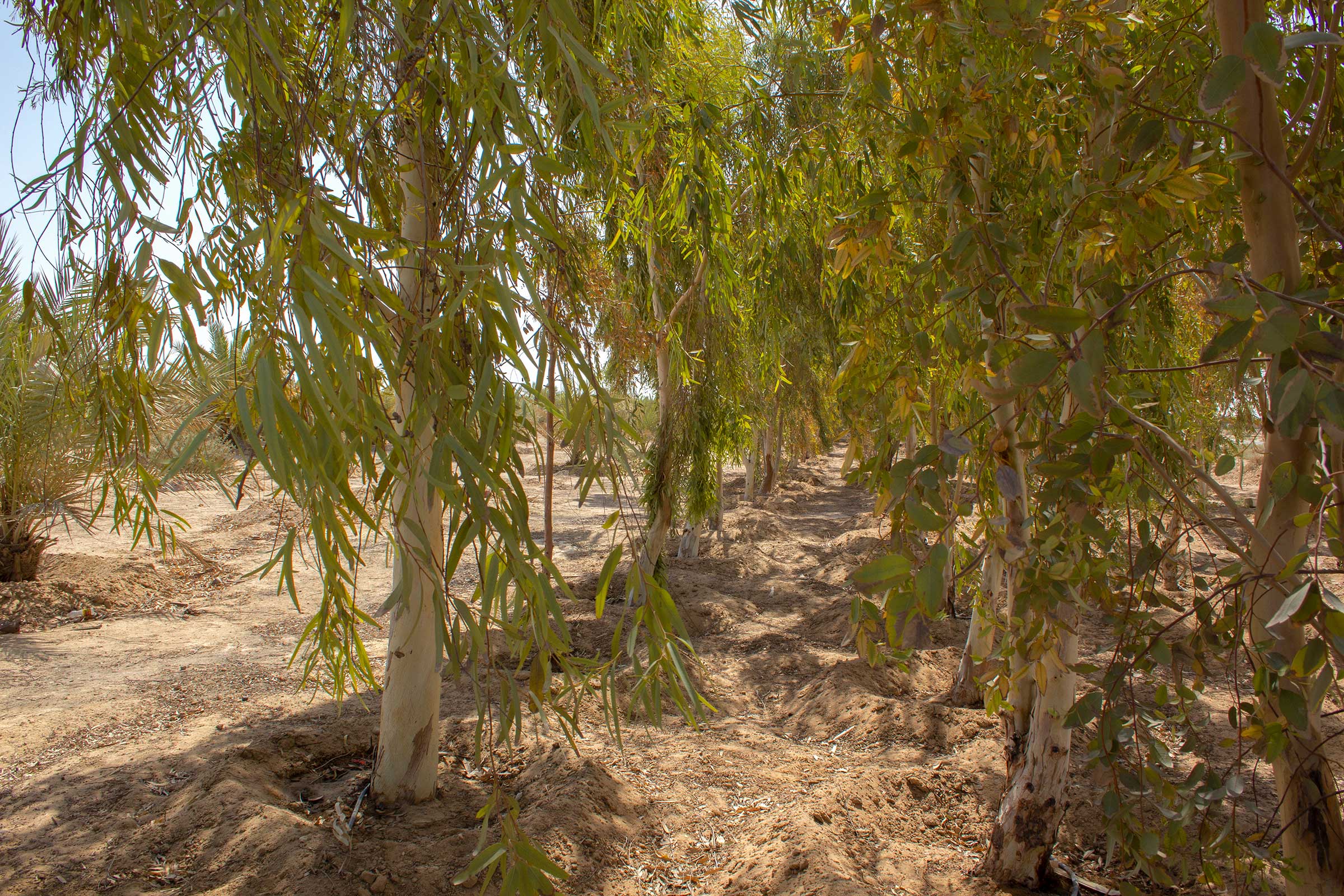
In Karbala, an Iraqi province just south of Baghdad, sun pours down from a cloudless blue sky, cooking the khaki-colored earth in 115°F temperatures. The smallest stirring of air sends dust swirling. Yet, in a patch of desert measuring just under a square mile outside Karbala city, the capital of the province, 70,000 date palms, in dozens of different species, sway quietly above the soil.
Workers hover around the trees, clipping dead branches and checking irrigation hoses running in the soil beside them. The garden, called El Fedek, is a project of the philanthropic arm of the organization that manages The Holy Shrine of Hussein—the resting place of Imam Hussein, one of Shi’a Islam’s most central figures, the grandson of the Prophet Muhammad. The Shrine attracts millions of pilgrims from around the world each year.
In an air-conditioned trailer sitting on cinder blocks amid the date palms—a national symbol of Iraq—Mohammed Adil Gilgawi, an engineer who works in the Fedek garden, sips tea and eats freshly picked dates. “In recent decades, the [country’s] date palms have been reduced by half,” he says, pointing to the series of wars—the 1980-1988 Iran-Iraq war, the 1990-1991 First Gulf War, and the 2003 U.S. invasion—over the past four decades as the main driver of this loss.
“With every war, there follows a state of chaos where a citizen might cut down forests or gardens to build apartments. Border areas with Kuwait or Iran full of palms were burned or bombed,” Gilgawi says, referring to Iraq’s conflicts with these two countries. Since the U.S. invasion in 2003 in particular, he adds, “the state has had little interest in saving the palms.”
Now, climate change is making things worse. Iraq is the fifth-most vulnerable country to the impacts of climate change, according to the U.N. Environment Programme. But the country is also the second-largest crude oil producer among OPEC nations. Its economy is highly dependent on maintaining a profitable industry—one which helps feed the rest of the world’s fossil fuel addiction, and the resulting climate crisis. Scientists have made clear that the world must dramatically reduce its reliance on fossil fuels in order to slow rising global temperatures. Until then, communities like those in Karbala will bear the brunt of the impact and face the challenge of finding local ways to adapt to this global problem.
Over the last four years, groups and institutions in Karbala like the Holy Shrine of Hussein, the Holy Shrine of Abbas, a handful of youth activist associations, and some farmers have increasingly taken matters into their own hands in the absence of state support and little local civil society or climate activism. “We need collaboration,” says Gilgawi. “One hand is not enough.”
The Fedek project began in 2015 with a $6.8 million loan from the Iraqi government. The goal was to bring nature back to Karbala. Since 2006, the province’s green area was reduced by 40%, according to local climate group Green Karbala. Over the years, much of the rich agricultural land that used to surround Karbala city has disappeared, leaving no fertile soil to capture moisture or moderate temperatures. Sometimes it’s so hot that going outside for long periods can be dangerous. As fewer trees grow due to the mounting heat and aridity—or are cut down in rampant urban development—the soil erodes, leading to desertification. This has impacted Karbala in particular, says Gilgawi, which is already located in a hot plane area of Iraq, and has seen temperatures increase by 1.6°C (2.88°F) from 1979 to 2019, well above the global average of 0.72°C (1.3°F) during that time period.
Around the world, agriculturalists and academics are increasingly focusing on how to adopt once-abandoned traditional land management practices in order to reduce these climate impacts. Passing on this knowledge is critical, says Zemen Al Shammari, one of the farmers who works part-time in the Fedek garden. As a date cultivation expert, he shows other workers in the garden “how to irrigate properly, how to harvest the dates, to repel pests,” he says of the sustainable farming practices used. “They ask me, ‘How do you know these techniques?’ I tell them that we learned from our fathers and grandfathers.”

Efforts to bring greenery back to Karbala extend beyond El Fedek. On the city’s outskirts, where Al Shammari lives, are many interconnected bustaans—Arabic for grove—which form a sort of small farm-forest filled with date trees along with pomegranates, eggplants, beans, and livestock all sheltered under the palm’s shade. Lush, verdant areas like these used to be more common in the center of Karbala city, but countless bustaans have been razed. Locals often blame urban sprawl as a major contributing factor to increasing heat and desertification in the city over the last two decades—which in turn makes it harder for the bustaans to thrive.
To counter this, Alhasan Ali Nasrallah, a master’s student in agricultural engineering at the University of Karbala, founded Green Karbala in 2019. The goal was to take action against the rapid and chaotic urban sprawl by preserving bustaans and creating new green spaces to reduce the city’s heat, improve the air, and capture moisture. The group’s first project in the fall of 2019 involved 250 planting activities over three days on the University of Karbala campus. “My friends and I started planting shrubs that could handle the heat and minimal water in Iraq: Acacia, Jujube trees, Eucalyptus”—all plants that Nasrallah cultivates in his own professional nursery, he says. “[We] showed locals how to care for the trees and told them, ‘This tree is yours. It’s your responsibility now.’”
In addition to talking with students about the environment, energy conservation, and climate change, the group also hands out brochures to educate pilgrims, says Hassan Zainy, another Green Karbala founding member. “We tell them that Imam Hussein defended the environment, that he cared about agriculture, not wasting food or burning land,” he adds.
While Green Karbala members handle most of the funding themselves, Nasrallah’s small nursery can’t cover the needs of all of its greening activities. So, the Holy Shrine of Hussein helps provide modest financial support—in the range of $400 per year—and plants. “We buy, say, 500 or 700 seedlings from the Holy Shrine of Hussein’s nursery for a discounted price,” says Nasrallah. It’s a tiny example of the sort of cooperation that must dramatically expand to make the fight against climate change in Iraq effective.

That said, these sorts of grassroots projects won’t be enough; a committed effort from the central government will also be necessary. But as Hayder Mohammed Abdul-Hameed, a professor at the University of Baghdad’s environmental engineering department, tells TIME via email, “until now, governmental involvement is very limited,” because of a lack of budget allocated for climate change mitigation, lack of community knowledge about climate impacts, political unrest, and financial corruption.”
But beyond government action—and a radical reduction in Iraq’s dependence on the oil industry—many say the international community should also play a role. That’s because countries like Iraq face some of the biggest burdens from climate change, yet have contributed far less to the problem—0.61% of global CO2 emissions in 2020—compared to major polluters like the U.S. and China. Some Iraqis say these wealthy, historical emitters have a special obligation to assist Iraq. At last year’s COP26 in Glasgow, for example, Jassim Al-Falahi, Iraq’s technical undersecretary of the Ministry of Environment, criticized developed countries for putting the onus on vulnerable countries to immediately shift away from oil without a clear transition plan.
“The responsibility of the international community now is to support Iraq to diversify its economic resources by way of technical support, improving its economic leadership, and through technology transfer,” he says.
Al-Falahi notes Iraq’s Ministry of Environment has been supporting “numerous projects to stop degradation of the soil, to fight desertification, projects for new environmental technologies, green belts, wind barriers,” along with initiatives to protect vulnerable farming communities and to encourage solar energy development. The central government is also working with local climate change groups in Iraq, he adds: “The door for collaboration is wide open.”
But Al Shammari, the farmer, is skeptical. “We citizens, we know about climate change. But if we go complain to the municipality, they won’t listen to us unless we give them a bribe. These troubles we’re in—it’s because of the government.”
In the meantime, Karbala is showing how a community can work together to weather the rising temperatures. These days, the air feels cooler under the shaded areas in and around the Fedek garden, says Gilgawi: “This spot was once barren desert. No birds, no animals, no life. Now there is water, animals.”
More Must-Reads From TIME
- The 100 Most Influential People of 2024
- Coco Gauff Is Playing for Herself Now
- Scenes From Pro-Palestinian Encampments Across U.S. Universities
- 6 Compliments That Land Every Time
- If You're Dating Right Now , You're Brave: Column
- The AI That Could Heal a Divided Internet
- Fallout Is a Brilliant Model for the Future of Video Game Adaptations
- Want Weekly Recs on What to Watch, Read, and More? Sign Up for Worth Your Time
Contact us at letters@time.com